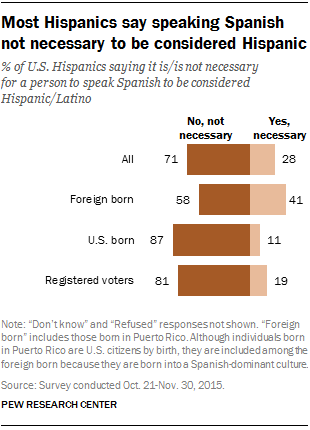During Saturday’s Republican presidential debate in South Carolina, Marco Rubio questioned (in English) whether Ted Cruz speaks Spanish. Cruz responded in Spanish with a challenge to Rubio to discuss their views on immigration in that language.
 Rubio’s confrontation with Cruz, who recently became the first Hispanic to win the Iowa caucuses, was interpreted by some as a challenge to how much Cruz belongs to or identifies with the Hispanic community in the U.S. (It’s worth noting that this is not a new tactic. Hispanic Democrats have been confronted before by fellow Latinos in a similar way.)
Rubio’s confrontation with Cruz, who recently became the first Hispanic to win the Iowa caucuses, was interpreted by some as a challenge to how much Cruz belongs to or identifies with the Hispanic community in the U.S. (It’s worth noting that this is not a new tactic. Hispanic Democrats have been confronted before by fellow Latinos in a similar way.)
But what does the Hispanic public think when it comes to the question of whether it is necessary to speak Spanish in order to be considered Hispanic?
On the one hand, Spanish is an important part of Latino culture and identity, with 95% of Latinos saying it is important for future generations to speak Spanish.
At the same time, most Latino adults say it is not necessary to speak Spanish to be considered Latino. According to a recent Pew Research Center survey of Latinos, 71% of Latino adults hold that view while 28% say the opposite.
Among Hispanics, views on speaking Spanish and Hispanic identity differ, though majorities of all key subgroups say speaking Spanish isn’t necessary to be considered Hispanic.
For example, 58% of immigrant Hispanics say speaking Spanish isn’t a necessary component of Latino identity, as do 87% of U.S.-born Hispanics. The 2015 survey of Latino adults also shows that among Hispanic registered voters, 81% say speaking Spanish is not required to be considered Hispanic.
While language use differs among Hispanics – some speak only English, some speak only Spanish and some are bilingual – Spanish is still a characteristic that, for the most part, unites much of group. About three-quarters of Latinos, no matter where they are from, speak Spanish at home.
Even so, the share that does so at home is declining at the same time that immigration from Mexico has slowed substantially and U.S. births have become the driver of Hispanic population growth. In fact, the share of Latinos who speak only English at home is rising. Today, 27% of Hispanics ages 5 and older live in a household where only English is spoken, compared with 22% in 2006.
Methodology: The data for this post on the relationship between speaking Spanish and Hispanic identity are drawn from our 2015 National Survey of Latinos, a nationally representative, bilingual survey of 1,500 Latino adults. It was conducted on cellular and landline telephones from Oct. 21 through Nov. 30, 2015. The margin of sampling error for the full sample is plus or minus 3.3 percentage points at the 95% confidence level.



